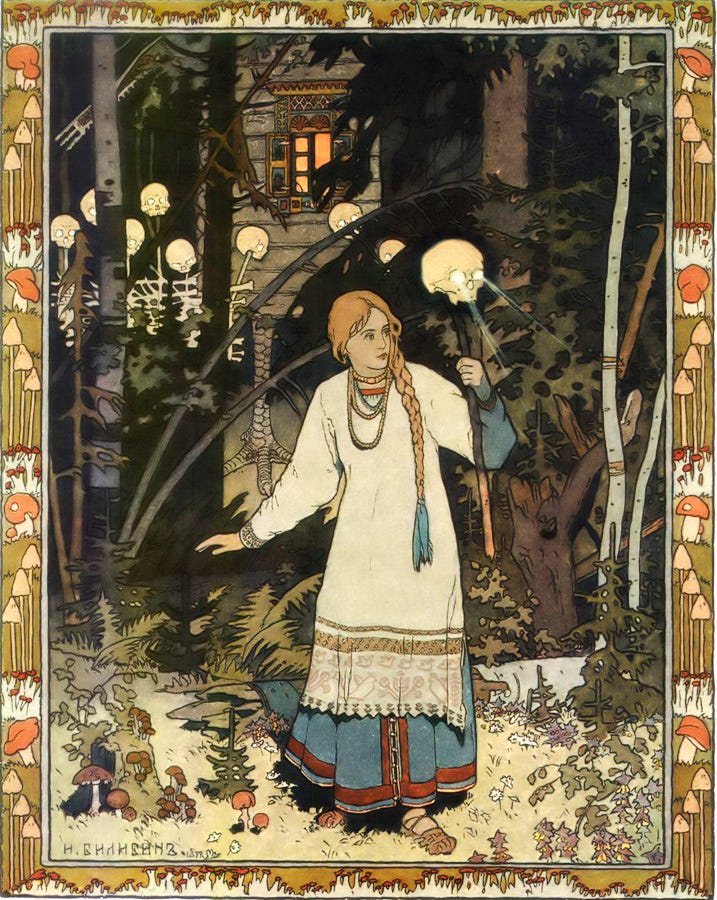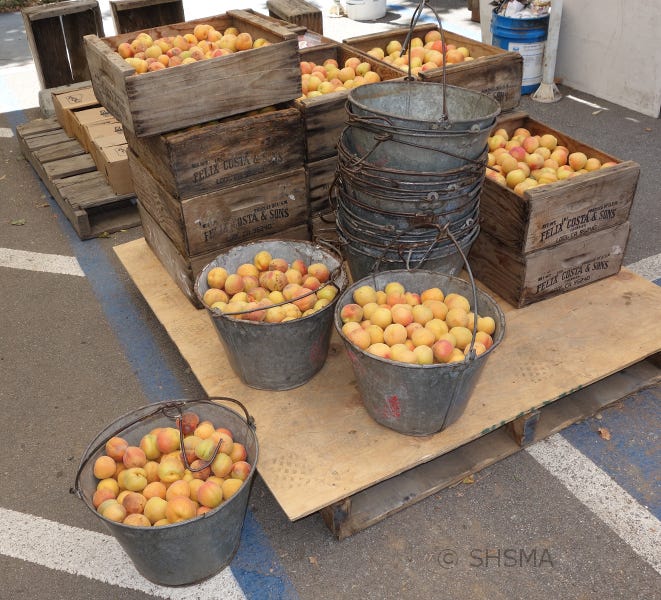Hello, I’m Kate Farrell, author of the Fairy Tale Heroine, as we explore the hidden terrain of the heroine’s unique quest together—how it can empower your life and inspire your creative work.
In the last three episodes, we met the major, archetypal characters in the feminine quest, and we encountered the deadly competition for feminine beauty. Our heroine was trapped in a destructive environment that restricted and diminished her status and limited her freedom. With no other option, the heroine escaped or was pushed into the wilds.
In this episode four, we follow the heroine as she escapes into the treacherous forest. She faces risk and possible death; how does she survive? We discover her heroic, archetypal tasks, ones she must accomplish—do or die—in this centuries’ old Slavic tale, then translated in my personal “coming of age” story.
“Baba Yaga and Vasilisa the Brave”
This tale continues from Episode Two. Vasilisa’s stepsisters have pushed her out of the hut on a stormy night when their hearth fire and all other lights went out.
So it goes:
"O my dear little doll," she said between sobs, "they are sending me to Baba Yaga's house for a light and I’m so afraid.”
"Never you mind," the doll replied, "you'll be all right. Nothing bad can happen to you while I'm with you."
About Vasilisa the forest rose like a wall, the dark night, and the howling wind. She walked along trembling and holding the little doll close. Vasilisa never stopped but walked on for a whole day, and it was getting on toward evening when she came out on to a small glade.
She looked, and she saw a hut standing there. The fence round the hut was made of human bones and crowned with human skulls. The gate was no gate but the bones of men's legs, the bolts were no bolts but the bones of men's arms, and the lock was no lock but a set of sharp teeth.
Vasilisa was horrified and stood stock-still. Night descended, and lo! the eyes of the skulls crowning the fence began to glow, and it became as light as if it was day.
Vasilisa came up to Baba Yaga on the porch, bowed low to her and said very humbly, "It is I, Vasilisa, Grandma. My stepsisters sent me to you to ask for a light."
"Oh, it's you, is it?" Baba Yaga replied. “ Very well, then, stay with me for a while and work, and then we'll see what is to be seen."
"And now, Vasilisa," said she, "take this sack of millet and pick it over seed by seed. And mind that you take out all the black bits, for if you don't I shall eat you."
And Baba Yaga closed her eyes and began to snore. Vasilisa took a piece of bread, put it before her little doll and said:
"Come, little doll, eat this bread, my dear, and I'll pour out all my troubles in your ear! Baba-Yaga has given me a hard task to do, and she threatens to eat me up if I do not do it."
Said the doll in reply: "Do not grieve and do not weep, but close your eyes and go to sleep. For morning is wiser than evening."
And the moment Vasilisa was asleep, the doll called out in a loud voice:
Tomtits, pigeons, sparrows!
On your help, my feathered friends,
Vasilisa's life depends.
And the birds came flying from all sides, flocks of them, more than eye could see or tongue could tell. They began to pick over the millet seed by seed. Into the sack the good seeds went, and the black went into the bin, and before they knew it the night was spent, and the sack was filled to the top.
"Have you done what I told you to do, Vasilisa?"
"Yes, it's all done, Grandma."
Baba Yaga was very angry, but there was nothing more to be said.
"Humph," she snorted, "I am off to hunt and you take that sack yonder, it's filled with peas and poppy seeds, pick out the peas from the seeds and put them in two separate heaps. And mind, now, if you do not do it, I shall eat you."
"Do take pity on me, little doll, my dear, and help me out."
And the doll called out in ringing tones:
"Come to me, o mice of the house, the barn, and the field, for there is work to be done!"
And the mice came running, swarms of them, more than eye could see or tongue could tell, and before the hour was up the work was all done.
Baba Yaga was very angry, but what could she say! The work was done and sorted.
To be continued in a future episode...
Reflections
What do the urgent tasks of separating seeds of grain mean to you?
Why are they vital? What is Vasilisa learning?
What is the significance of her helpers in the tasks; what do they represent?
Personal Story: Cannery, 1960
Kate Farrell
Back then, the Santa Clara Valley (Silicone Valley) was home to hundreds of fruit orchards, the largest apricot producer in the world. At the County Department of Employment in San Jose, I found a posting for seasonal work in an apricot cannery within a mile or so from my parents' new tract home. Excited to find a summer job within walking distance for a good hourly wage, I immediately applied, eager to earn money for my sophomore year in college.
I was hired just in time for the first day of work and prepared myself for a physical ordeal. Standing on the catwalk along the conveyer belt, I waited. "Starting up!" The beefy guy on the high platform yelled loud enough for every worker in the barn-sized workhouse to hear. He turned on the conveyor belt with a clank and a lurch and dumped the first crate of apricots through an array of sprayers—fresh off the orchard trees just outside the canning shed doors.
As a jumbled heap of apricots rolled towards me, the first station on the belt, I clenched my paring knife in one hand and used the other to sort through the fruit. Scanning the mess, I grabbed twigs, leaves, green 'cots, and other debris that went into a bucket on my left side; looked for rotten fruit that went into a bucket on my right side, along with any brown or bruised spots I trimmed with my knife.
That first day on the job, there were about fifteen workers stationed along the catwalk on either side of the belt. Bent with a steady focus to the never-ending blur of 'cots, nevertheless I noticed a tall, dark man with a pencil thin mustache, wearing well-pressed khakis, slink behind us on the narrow ledge.
The second day, there were only seven of us. Unknown to me, a rookie at seasonal canning jobs, the foreman and floor lady had watched for speed and accuracy and kept only the fastest workers. At the morning break, I learned about that practice from my co-workers.
The only Anglo on the belt, and the only English speaker, I was proud I'd passed the test against more experienced help. I retied my splattered, plastic bib apron, ready to prove my worth again, and earn the much-needed expense money for college.
On the fourth day, I was on the catwalk on time, ready to work. Just before the conveyor belt started up, I saw an older Portuguese woman next to me make the sign of the cross. She told me that her work was a prayer.
One day, during our half-hour lunch taken just outside the open barn doors, the Portuguese woman came to me. Everyone who worked on the belt was sitting on old crate boxes under the corrugated overhang, in a jumbled group, eating our homemade sandwiches. Over the weeks, my basic Spanish and Portuguese had improved; the older woman and I continued working side by side.
She stood over me, bent slightly and placed her hand on my shoulder. Looking directly into my eyes, she said in Portuguese, "Quando você se senta, Deus se senta com você." (When you sit down, God sits down with you.) It was a blessing, and touched me deeply. I was surprised. How could she see the divine within me?
When the last apricot crate was picked and canned, the job was over for the season and I’d earned almost enough for my sophomore year. But I would earn it in the weeks to come—at a donut house.
Reflections
What was I learning in this summer job in the apricot canning shed?
Who were my helpers, like Vasilisa’s?
Who was my Baba Yaga? In what way?
Write your own “Into the Wilderness” challenge story. Who was your Baba Yaga and what were your challenges?












Share this post